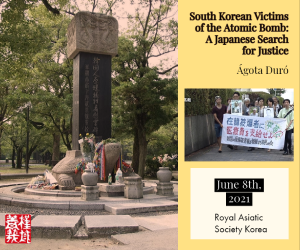Sharing the online lecture held on June 8, 2021.
Lecture title: ‘The South Korean atomic bomb victims’ seven-decade quest for recognition assisted by Japanese grassroots circles: A comprehensive study’
Lecturer: Ágota Duró
Date: Tuesday, June 8. 07:30PM (Seoul)
Abstract:
When the United States dropped two atomic bombs on Hiroshima and Nagasaki in August 1945, not only Japanese but an estimated 70,000 Koreans were also trapped under the mushroom clouds. To challenge the prevailing rhetoric that A-bomb survivors (hibakusha) are exclusively Japanese, this study traces the trajectory of South Korean victims from their manifold sufferings to the Japanese government’s ultimate recognition of their rights. The initial relief laws Japan enacted in 1957 and 1968 provided indispensable assistance for Japanese hibakusha as they were going through the process of physical and emotional recovery. In stark contrast, overseas victims were excluded from these medical and welfare provisions. However, Son Jin-doo (孫振斗) brought about significant changes in the status of foreign survivors with his Supreme Court victory in 1978 while gaining the assistance of Japanese grassroots circles critical of their country’s wartime atrocities. The history of Japanese civil society advocating for the recognition of South Korean A-bomb victims provides additional insight into how Korean hibakusha victimized by Japan have asserted their rights and found some measure of peace through the support of a group of Japanese citizens feeling remorse for their country’s wartime atrocities.
Biography of the author:
Ágota Duró is a Visiting Researcher at Hiroshima City University. Originally from Hungary, she obtained her Ph.D. in Peace Studies from the Graduate School of International Studies, Hiroshima City University in 2017. She authored articles entitled “A Pioneer among the South Korean Atomic Bomb Victims: Significance of the Son Jin-doo Trial” (2016) published in the Asian Journal of Peacebuilding, “Medical Assistance for Korean Atomic Bomb Survivors in Japan: (Belated) Japanese Grassroots Collaboration to Secure the Rights of Former Colonial Victims” (2018) in The Asia-Pacific Journal, and “Historical Counter-Narratives: Japanese Christians’ Advocacy for South Korean Atomic Bomb Victims,” in the Japanese Journal of Religious Studies (2020). Her current research focuses on Japanese and South Korean grassroots and religious movements to repatriate the remains of Koreans buried in wartime Japanese mass graves.


![[Lecture Video Archive] ‘The North Korean workers in Russia’ by Andrei Lankov](http://raskb.com/wp-content/uploads/2024/03/Lecture_Lankov_20240326_2-1-500x383.png)
![[Lecture Video Archive] ‘My 인연 with a 한옥’ by AnnA Cybele Paschke](http://raskb.com/wp-content/uploads/2024/02/Cybele-Take-2-500x383.png)
![[Lecture Video Archive] ‘Experimental Artists Confront Conformity in Seoul, 1968-70’ by Matt VanVolkenburg](http://raskb.com/wp-content/uploads/2023/12/VanVolkenburg_20240116-500x383.png)
![[Lecture Video Archive] ‘Saving Confucius from Confucianism’ by Prof. Werner Sasse](http://raskb.com/wp-content/uploads/2023/10/Sasses-Confucianism-500x383.png)
![[Lecture Video Archive] ”Sool’ Diplomacy: Korea’s Traditional Alcohol as Soft Power’ by Matt Watson](http://raskb.com/wp-content/uploads/2023/11/399908173_10168238831825322_6737575409176720469_n-500x383.jpg)